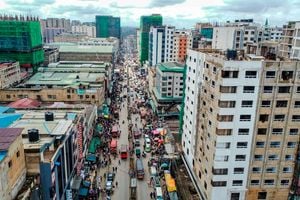
A state corporation is under probe by a parliamentary watchdog committee over alleged cancellation of a multi-billion tender.
National Assembly Public Investments Committee on Commercial Affairs and Energy is investigating the Geothermal Development Corporation (GDC) controversial cancellation of a Sh344.5 million tender.
The MPs' visit to the Menengai Geothermal fields in Nakuru county on June 20, also unraveled troubling issues.
The committee said it had uncovered serious irregularities and financial mismanagement that have hampered the company's ability to effectively exploit Kenya's vast geothermal resources.
The investigation began after scrutinising various GDC audit reports dating back to 2013, which revealed a pattern of inefficiency and questionable financial practices.
One of the key findings of the committee, chaired by Pokot South MP David Pkosing, is the extent of untapped resources in the Menengai geothermal fields.
According to the audit reports tabled in Parliament, they highlight that GDC has Sh4.4 billion worth of unused supplies and equipment at Menengai.
Additionally, steam wells capable of generating 300 megawatts of electricity are sitting idle due to delays in setting up power plants at the site.
The company held drilling supplies and equipment valued at Sh4.42 billion as of June 30, 2021. It only utilised items valued at Sh347.9 million, which is eight per cent of the stock,” reads part of an audit by Auditor General Nancy Gathungu for the year 2020/2021.
The firm’s financial performance for the year 2020/2021 was underwhelming, with only a small fraction of resources being put to use despite the vast amounts of idle equipment.
The lost inefficiency extends to GDC's drilling rigs.
The company owns seven rigs with a net value of Sh7.7 billion, purchased at an aggregate cost of Sh15.9 billion.
However, according to Ms Gathungu's audit, four of these machines, valued at Sh4.2 billion, have remained unused for the past four financial years. The audit report by Auditor General Nancy Gathungu raised concerns about this under-utilisation and the potential for the equipment to become obsolete due to rapidly evolving technology.
The audit also revealed financial mismanagement and irregularities in GDC's procurement processes.
The cancellation of the Sh344.5 million tender with Cluff Geothermal Limited, a UK company, resulted in significant financial losses.
GDC had paid Sh59 million for the first phase of the project before the contract was cancelled. The British company later won Sh211 million in arbitration after the contract was cancelled midway.
MPs have questioned the procurement process used by GDC in awarding the contract to the international firm to do work that could have been done by a local company.
It has also emerged that the decision to embark on the project to drill 20 wells simultaneously, as part of the government's Vision 2030 plan to realise 5000 megawatts of geothermal energy, was also rushed.
The controversial project was carried out by a London-based company, which later sued Kenya and was awarded Sh211 million by a UK court after the contract was cancelled midway.
The company drilled 14 wells, of which only six were successful, while the other eight were abandoned. The successful ones, however, failed to produce the steam needed to generate electricity.
"Why did GDC award the contract to an international company? Who are these people? Are they Kenyans? Were there no local companies capable of handling such a project?" asked Mr Pkosing when GDC boss Paul Ngugi appeared before the committee.
"This looks like a tailor-made contract to ensure that Cluff Geothermal Limited gets the contract," Pkosing added.
The committee was particularly concerned about why GDC agreed to enter into arbitration with Cluff Geothermal Consortium and paid the arbitrated amount in full, even though the consortium had not completed the contracted work.
However, GDC Managing Director Paul Ngugi, argues that the procurement was conducted through an open tender, advertised on the 28th and 29th of November 2012, in two local daily newspapers, the Daily Nation and the Standard, allowing for broad participation.
“Under the contract, each well was to be drilled to a measured ‘true vertical depth’ of 1,000 meters or a total true vertical depth to a minimum of 2,000 meters,” said Ngugi.
When asked if the Attorney General’s Office was involved in the tendering process, Solicitor General Shadrack Mose, appearing before the committee, stated that their advice was not sought, when a dispute erupted between the two parties.
The contract with Cluff Geothermal Limited, initiated in 2013, was for the drilling of 20 geothermal wells at a cost of Sh 4.2 billion (USD 41,219,208).
The contract, awarded under the tenure of former GDC Director Silas Simiyu, included local partners Great Rift Drilling and Ardal Risk and Support Services (K) Limited.
The direct procurement of legal services despite the company having pre-qualified lawyers in the 2020/2021 financial year has also been questioned.
It emerged that the company hired a private law firm to represent it in a constitutional petition filed before the Employment and Labour Relations Court by five (5) senior managers.
GDC used the Direct Procurement method to contract the firm on grounds that it was impractical to apply other methods as the matter was urgent.
However, the direct procurement method applied did not meet the conditions set out in Section 103 of the Public Procurement and Asset Disposal Act, 2015 as the company had a list of prequalified lawyers from which a restricted tender could have been considered.
And in what could return to haunt former GDC Managing Director Silas Simiyu and about five other officials of the firm, MPs have directed GDC boss Paul Ngugi to provide the committee with the tender documents, payment vouchers and company details as investigations into the tendering irregularities continue.
MPs fear that millions more may have been lost in suspicious tenders and illegal payments at GDC.
MPs have indicated that those responsible for authorizing the payment, particularly in the cancelled tender, would be held accountable for the loss of taxpayers' money.
The tendering probe comes at a time when the Auditor General has raised queries on the company's financial status and loss of resources, as its activities remain behind schedule.
The company for instance incurred losses amounting to Sh2.89 billion between December 2017 and January 2020, owing to vandalism and theft from four of its rigs at Menengai in Nakuru, despite the presence of a hired security firm.
An audit of the company's monthly payroll revealed that in 2020, the company illegally paid overtime allowances totalling Sh6.2 million to employees without supporting documents.
“The company’s policy on payment of overtime allowances, approvals for the payments, timesheets completed by the payees and the payment rates applied were not provided for audit. As a result, the occurrence, validity and measurement of overtime allowances totalling Sh6,232,390 could not be confirmed, “reads part of an audit report for the financial year 2020/2021.
Further analysis of payroll data revealed that salaries and allowances paid to employees amounted to Sh651.2 million, of which only Sh491,544,000 or 75 per cent was recorded as recurrent expenditure.
The management did not provide documentary evidence, including accounting policies, to explain the basis for the apportionment of 25 percent of the costs totalling Sh162,806,003 to capital expenditure.









